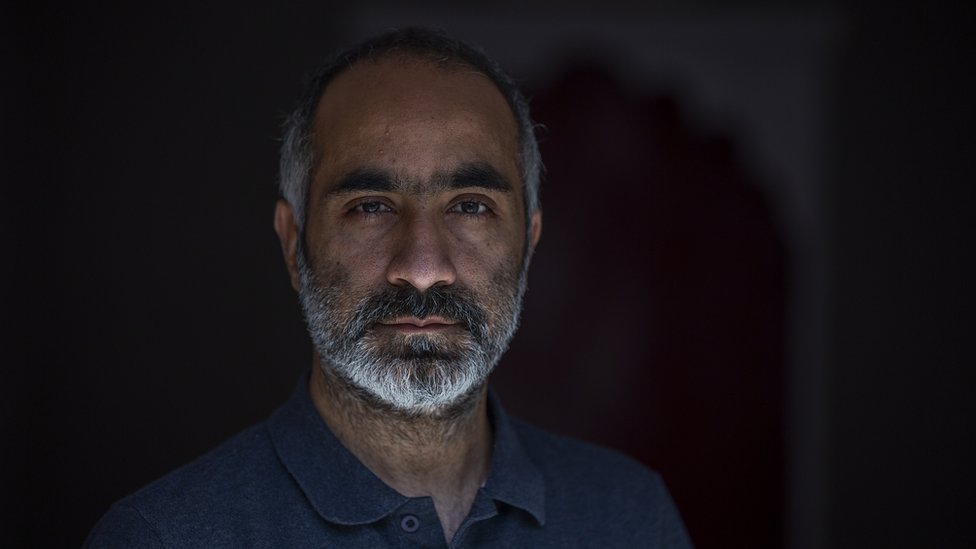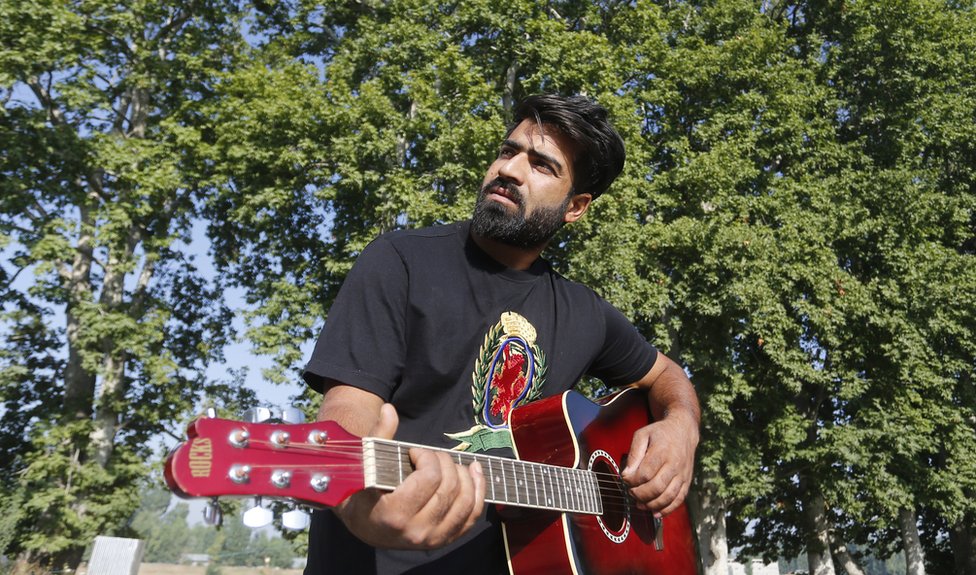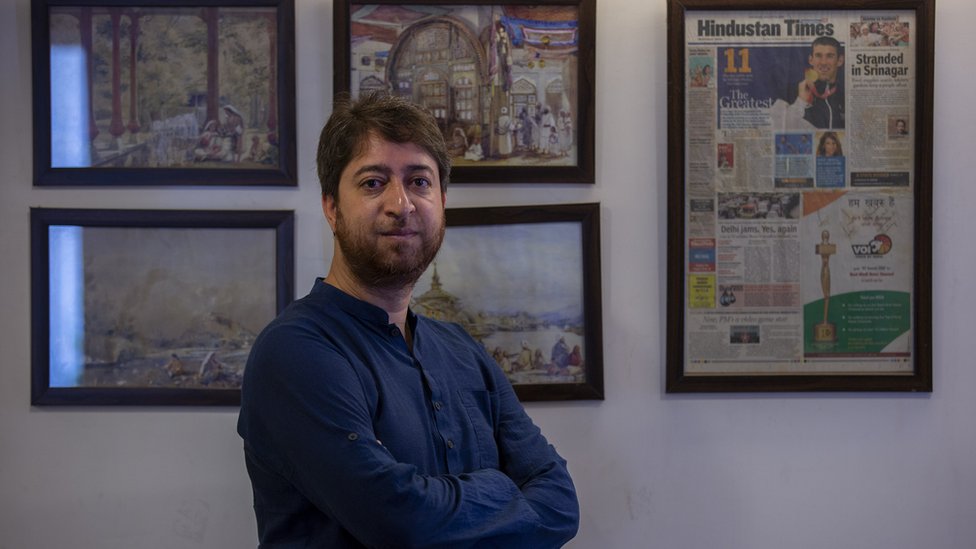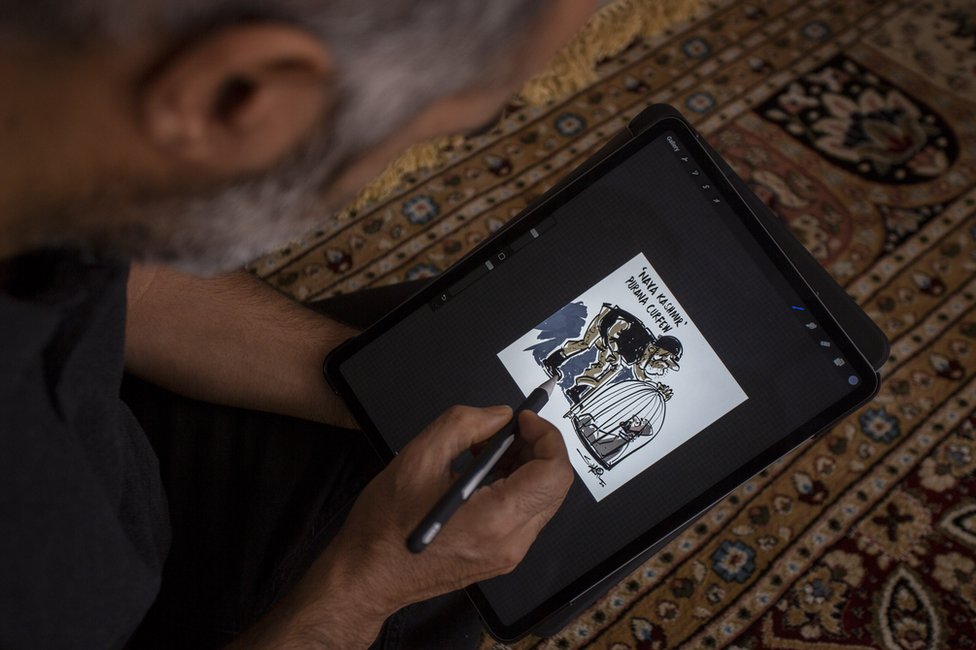
Suhail Naqshbandi quit his job after his newspaper refused to publish his work
On 5 August last year India revoked the special status of Jammu and Kashmir, split it into two federally-run territories and imposed an unprecedented lockdown. Jehangir Ali reports from Srinagar on why the move has come as a blow to freedom of expression in the valley.
Months after Narendra Modi's ruling Bharatiya Janata Party (BJP) stripped the region of its autonomy, a homemaker in the Muslim-dominated valley told a friend of her son to be careful.
"Swear on me, son," Shameena Bano told Ishfaq Kawa, "I want you to stay at home."
The fears of the 58-year-old wife of an apple farmer were not unfounded.
Her son Ashiq Hussain Dar had gone out on work from his home in the restive Shopian region in 2014. The 27-year-old never returned home.
Ashiq was among the thousands who have disappeared in the past 20 years amid an insurgency against Indian rule in Kashmir.
Ms Bano believes that security forces picked up her son. The Indian army has always denied such charges.
For Ms Bano the crackdown in August was just a grim reminder of the continuing turmoil in the Muslim dominated valley, home to eight million people.
In the immediate aftermath of the decision, the valley was strangled by a communications blockade. Thousands of political leaders, businesspeople and activists were detained. Protests were outlawed. Security forces were accused of carrying out beatings and torture. India consistently called the allegations "baseless and unsubstantiated".
Mr Kawa took Ms Bano's advice seriously.
He had lost his job as a marketing executive at an automobile firm. So he hunkered down and began writing poetry.

On 5 August last year India revoked the special status of Jammu and Kashmir, split it into two federally-run territories and imposed an unprecedented lockdown. Jehangir Ali reports from Srinagar on why the move has come as a blow to freedom of expression in the valley.
Months after Narendra Modi's ruling Bharatiya Janata Party (BJP) stripped the region of its autonomy, a homemaker in the Muslim-dominated valley told a friend of her son to be careful.
"Swear on me, son," Shameena Bano told Ishfaq Kawa, "I want you to stay at home."
The fears of the 58-year-old wife of an apple farmer were not unfounded.
Her son Ashiq Hussain Dar had gone out on work from his home in the restive Shopian region in 2014. The 27-year-old never returned home.
Ashiq was among the thousands who have disappeared in the past 20 years amid an insurgency against Indian rule in Kashmir.
Ms Bano believes that security forces picked up her son. The Indian army has always denied such charges.
For Ms Bano the crackdown in August was just a grim reminder of the continuing turmoil in the Muslim dominated valley, home to eight million people.
In the immediate aftermath of the decision, the valley was strangled by a communications blockade. Thousands of political leaders, businesspeople and activists were detained. Protests were outlawed. Security forces were accused of carrying out beatings and torture. India consistently called the allegations "baseless and unsubstantiated".
Mr Kawa took Ms Bano's advice seriously.
He had lost his job as a marketing executive at an automobile firm. So he hunkered down and began writing poetry.

Ishfaq Kawa's lockdown songs picked up more than a million views on YouTube
He dug into his savings and borrowed from friends, and with the money he bought equipment and turned his room into a makeshift recording studio. He wanted to turn his poems into songs.
One of Mr Kawa's songs went:
Someday you will look for me all over/You will weep for a visit from the sympathiser/ But keep your heart turned to me/I will come back as a dream
"I tried to capture the pain of separation. It could be an expression of a mother's longing for her son, or of lovers or friends who were separated due to the lockdown," said Mr Kawa.
He recorded another song called Nund Bani (Beloved), a painful dirge of a mother longing for her disappeared son. The video of the song was viewed more than 1.5 million times and drew over 8,000 comments on YouTube.
Many like Mr Kawa have resumed their work quietly during the lockdown, now exacerbated by the Covid-19 pandemic in the state. Jammu and Kashmir has reported more than 7,500 infections and over 400 deaths from the disease so far.
A few months before the stripping of Kashmir's autonomy Suhail Naqshbandi, a Srinagar-based cartoonist, quit his job after the newspaper he worked for began to refuse publishing his work.
As the lockdown was imposed, Mr Naqshbandi couldn't draw. He had to deal with the anxieties of his seven-year-old son who kept asking questions about not being able to go to school or play with his friends. He resumed work only months later.
One of his recent artworks shows a cluster of houses in Srinagar on fire. A plume of smoke rises with the words of India's first prime minister Jawaharlal Nehru that Delhi will uphold the right to self-determination of the people of Kashmir. His work was widely shared on social media.

He dug into his savings and borrowed from friends, and with the money he bought equipment and turned his room into a makeshift recording studio. He wanted to turn his poems into songs.
One of Mr Kawa's songs went:
Someday you will look for me all over/You will weep for a visit from the sympathiser/ But keep your heart turned to me/I will come back as a dream
"I tried to capture the pain of separation. It could be an expression of a mother's longing for her son, or of lovers or friends who were separated due to the lockdown," said Mr Kawa.
He recorded another song called Nund Bani (Beloved), a painful dirge of a mother longing for her disappeared son. The video of the song was viewed more than 1.5 million times and drew over 8,000 comments on YouTube.
Many like Mr Kawa have resumed their work quietly during the lockdown, now exacerbated by the Covid-19 pandemic in the state. Jammu and Kashmir has reported more than 7,500 infections and over 400 deaths from the disease so far.
A few months before the stripping of Kashmir's autonomy Suhail Naqshbandi, a Srinagar-based cartoonist, quit his job after the newspaper he worked for began to refuse publishing his work.
As the lockdown was imposed, Mr Naqshbandi couldn't draw. He had to deal with the anxieties of his seven-year-old son who kept asking questions about not being able to go to school or play with his friends. He resumed work only months later.
One of his recent artworks shows a cluster of houses in Srinagar on fire. A plume of smoke rises with the words of India's first prime minister Jawaharlal Nehru that Delhi will uphold the right to self-determination of the people of Kashmir. His work was widely shared on social media.

Journalist Peerzada Ashiq was called in for questioning by the police for one of his reports
Another shows a Kashmiri man, gagged and tied to a tree in a garden with a "Stay Home Stay Safe" notice, turning his head to look at an Indian photographer who is taking pictures of tourists in traditional Kashmiri dresses.
"It helps me externalise the pain of being a Kashmiri, of being a victim of oppression," said Mr Naqshbandi. "Yes, the question of safety is there. But then if I don't express myself, it will affect me more."
Most artists and journalists say their freedoms have been curtailed since last August.
In April the police filed a complaint against and called in Peerzada Ashiq, a journalist belonging to the influential The Hindu newspaper, for reporting that the government had allowed two families to exhume the bodies of their militant sons from a graveyard after "police denied them permission".
In February, Outlook magazine journalist Naseer Ganai was questioned by police for reporting on a statement by an outlawed separatist group.
When a young journalist wrote about the alleged assaults on civilians by government forces during combing operations, a police officer called her in.
"At this time, being a mature person," the officer told her, "you should be writing positive stories about Kashmir."
One recent morning in July, a relative of the journalist was roughed up at a police checkpoint. The journalist posted about the incident on Twitter.
Soon, a police officer called the journalist, asking her to report there within an hour.
At the police station, the cops asked to file a complaint, which the journalist denied. "It was pointless to file a complaint. Our colleagues have been targeted for years. So many of them have filed complaints but has the government acted?"
The officer then dictated a tweet and asked the journalist to post the "clarification" on Twitter which she did. When the journalist left the police station, the officer told her that he would be following her work in the papers.

Another shows a Kashmiri man, gagged and tied to a tree in a garden with a "Stay Home Stay Safe" notice, turning his head to look at an Indian photographer who is taking pictures of tourists in traditional Kashmiri dresses.
"It helps me externalise the pain of being a Kashmiri, of being a victim of oppression," said Mr Naqshbandi. "Yes, the question of safety is there. But then if I don't express myself, it will affect me more."
Most artists and journalists say their freedoms have been curtailed since last August.
In April the police filed a complaint against and called in Peerzada Ashiq, a journalist belonging to the influential The Hindu newspaper, for reporting that the government had allowed two families to exhume the bodies of their militant sons from a graveyard after "police denied them permission".
In February, Outlook magazine journalist Naseer Ganai was questioned by police for reporting on a statement by an outlawed separatist group.
When a young journalist wrote about the alleged assaults on civilians by government forces during combing operations, a police officer called her in.
"At this time, being a mature person," the officer told her, "you should be writing positive stories about Kashmir."
One recent morning in July, a relative of the journalist was roughed up at a police checkpoint. The journalist posted about the incident on Twitter.
Soon, a police officer called the journalist, asking her to report there within an hour.
At the police station, the cops asked to file a complaint, which the journalist denied. "It was pointless to file a complaint. Our colleagues have been targeted for years. So many of them have filed complaints but has the government acted?"
The officer then dictated a tweet and asked the journalist to post the "clarification" on Twitter which she did. When the journalist left the police station, the officer told her that he would be following her work in the papers.

Mr Naqshbandi has begun drawing again during the lockdown
"The episode took a huge mental toll and I had to visit a psychiatrist," the journalist, who prefers to remain unnamed, said.
Rights group Amnesty International has documented at least 10 instances where journalists were pulled up for their reports.
"Harassment and intimidation of journalists through draconian laws threatens the efforts to address the Covid-19 pandemic and creates an atmosphere of fear and reprisal in Kashmir," Amnesty says. Dr Sheikh Showkat, who teaches law at the Central University of Kashmir, says there is an "illusion of normalcy, but there is an undeclared censorship in place".
Kashmiris are no strangers to lockdowns. According to a recent report by Kashmir Chambers of Commerce and Industry, the valley has shut down for more than 3,000 days since 1989 when an armed insurgency against Indian rule erupted in the region.
But the lockdown since last August has been more crippling than those in the past.
The ban on high speed mobile internet has grounded businesses. Students have struggled during online classes due to poor connectivity. Technology lawyer Mishi Choudhary says "365 days of no to slow Internet in 'Digital India' is an unjustified government interference with basic rights of a population". Some 80% of the jobs in the once-thriving tourism industry have been lost in the past year, a report by The Forum for Human Rights in Jammu and Kashmir said.
"The mood [in Kashmir] can't be described as one of hope or optimism," Dr Aijaz Ashraf Wani, who teaches political science at the University of Kashmir, says.
"It will increase distrust which has become the immediate cause of youth picking up the gun to fight Indian rule. I am not sure how this is going to be addressed or if there is actually any concern about this in Delhi."
Jehangir Ali is an independent journalist based in Srinagar
"The episode took a huge mental toll and I had to visit a psychiatrist," the journalist, who prefers to remain unnamed, said.
Rights group Amnesty International has documented at least 10 instances where journalists were pulled up for their reports.
"Harassment and intimidation of journalists through draconian laws threatens the efforts to address the Covid-19 pandemic and creates an atmosphere of fear and reprisal in Kashmir," Amnesty says. Dr Sheikh Showkat, who teaches law at the Central University of Kashmir, says there is an "illusion of normalcy, but there is an undeclared censorship in place".
Kashmiris are no strangers to lockdowns. According to a recent report by Kashmir Chambers of Commerce and Industry, the valley has shut down for more than 3,000 days since 1989 when an armed insurgency against Indian rule erupted in the region.
But the lockdown since last August has been more crippling than those in the past.
The ban on high speed mobile internet has grounded businesses. Students have struggled during online classes due to poor connectivity. Technology lawyer Mishi Choudhary says "365 days of no to slow Internet in 'Digital India' is an unjustified government interference with basic rights of a population". Some 80% of the jobs in the once-thriving tourism industry have been lost in the past year, a report by The Forum for Human Rights in Jammu and Kashmir said.
"The mood [in Kashmir] can't be described as one of hope or optimism," Dr Aijaz Ashraf Wani, who teaches political science at the University of Kashmir, says.
"It will increase distrust which has become the immediate cause of youth picking up the gun to fight Indian rule. I am not sure how this is going to be addressed or if there is actually any concern about this in Delhi."
Jehangir Ali is an independent journalist based in Srinagar
Published 6 August, Courtesy: BBC





No comments
Post a Comment